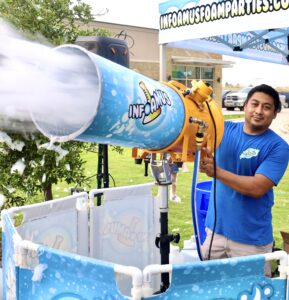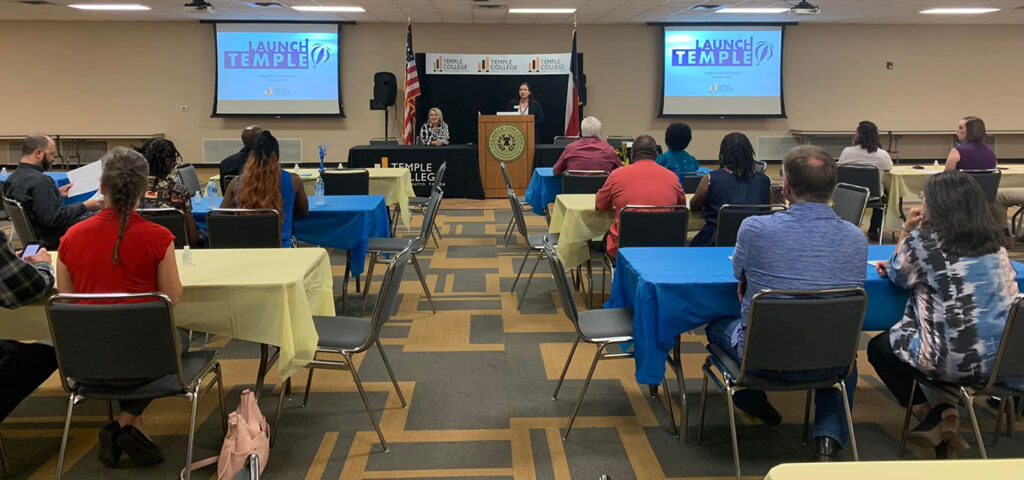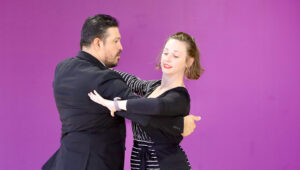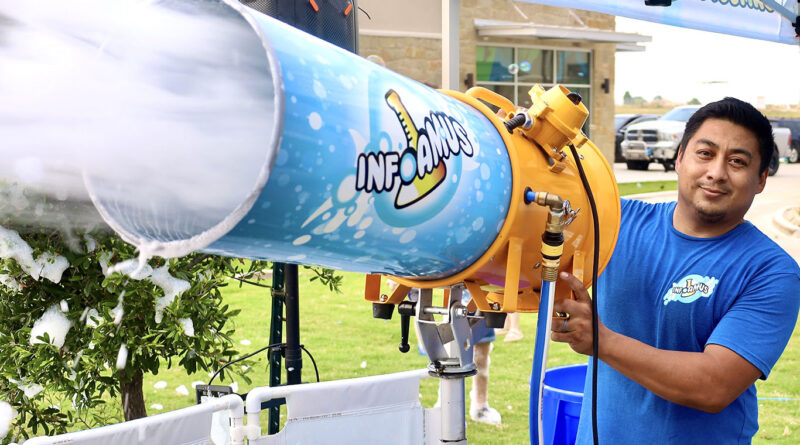Aspiring entrepreneurs make dreams a reality with Launch Temple
By David Stone

Marcos Gomez had a dream as big as a bounce house.
For years — in between shifts as an EKG program coordinator at Temple College and the VA — Marcos had big ideas about someday opening an amusements business and providing inflatable fun at parties. He never thought his ideas would amount to more than doodlings on a napkin.
“I had plenty of ideas,” he said. “But I had no idea how to grow a business, and I lacked the confidence to turn my ideas into an actual company. I needed some help.”
About that time, Marcos heard about a new program being started at Temple College. It was called Launch Temple, and it was designed to help young entrepreneurs get their businesses started, organized and growing.
According to Nancy Glover, director of Housing & Community Development for the city of Temple, Launch Temple took root during the pandemic years.
“The city had received money from the federal Cares Act to provide assistance for businesses struggling from the pandemic,” she said. “A lot of businesses had to make changes because of social distancing and protecting customers and employees — like putting plexiglass shields in place — and those changes were expensive. Plus, they had fewer customers and they had to shut down for a while. It was tough times.”
“The city received the federal funding, and we worked with the Chamber of Commerce and the United Way to create an application process,” she said. “When we were going through the applications, it became clear that a significant number of business owners didn’t have the primary paperwork a small business should have — financial reports, revenue projections, budgets, that sort of documentation. Many didn’t have the information or know how to prepare it.”
Nancy said she discussed the concerns with Chamber President Rod Henry, and they decided to find a program to help local entrepreneurs develop business essentials. No quick decision was made, but the seeds of Launch Temple were germinated and sowed.
About a year later, in 2021, Glover was asked to take over as community projects coordinator for the Rotary Club of Temple South, and she thought back to those discussions with Henry. An internet search led to the Launch My City program, which consisted of a 10-week educational component, networking, mentorship and a financial loan program.
After presenting the idea to Rotary South, the Rotary Club of Temple was asked to get involved with the project. It was an easy sale — Rod Henry was part of the other Rotary organization.
“After a few tweaks, Launch My City became Launch Temple,” Glover said. “The two Rotary Clubs formed it as a joint venture, and it was modeled after Launch programs in Raleigh and Detroit. The Rotary Club of Raleigh did the footwork and developed a plan for other clubs to use.”

The group presented the Launch Temple plan to Temple College and the little entrepreneur class began to sprout. “We spent the summer of 2021 getting the program organized, and we launched our first group in March 2022,” she said.
During that planning summer, Glover and Henry met frequently with Dr. Christy Ponce, the president of Temple College, and Thomas Sinkey, a senior vice president at Extraco Banks. They worked on a program to teach business owners — and those planning to start a business — the basics.
When March rolled around, 16 “students” had signed up for the program, according to DeDe Griffith, who served as co-instructor along with Treva Askey.
The group ranged from owners of established businesses, to those who were planning to launch in the near future, to some with business concepts in their heads. After a first meeting, where participants described their plans and met one another, the group met with leaders of the business community and experts each week to discuss a topic related to growing a successful business. Topics changed each week and ranged from bookkeeping to business plans to marketing.
“Personally, I thought the inaugural Launch Temple went great, especially for a first-year program,” Griffith said. “I think it was a definite success — we learned a lot about our community and how we can make changes for the better.”
Most members of the initial cohort still keep in touch, some on a weekly basis.
“We talk all the time,” Gomez said. “It’s like a support system. We collaborate, help each other out and share resources. We often refer our customers to the other Launch Temple businesses.”
One of the presenters for the first season of Launch Temple returned for the second round, but in a different capacity. This time, he has taken over as instructor, and Griffith and Askey now serve as advisors.
“When we started the second cohort, participants were given 3×5 cards and asked to write their name, their business and what they needed to succeed on the card,” said James Skinner, director of adult education and literacy at Temple College. “Then we focused on those needs.”
“We took nothing away from the initial curriculum, but we rearranged and added content,” he said. “We added a session on the impact artificial intelligence has made on marketing. COVID sent everyone online, and new AI-generated marketing is a big thing.”
“When Launch Temple started, we ran college-level curriculum,” Griffith said. “We still do, but we have customized the course to fit the needs of our students.”

Another change was made to the way students interact with mentors. In year one, each program participant was paired with a mentor, a successful business owner from the Temple area. For year two, a panel of mentors was assembled and students had access to the entire panel.
Skinner and Griffith said tweaks will continue to be made before next year’s third edition of Launch Temple.
“We will eliminate some of the technology so time is spent on learning content, not technology,” Griffith said.
Skinner emphasized that one of the key elements of Launch Temple is the building of community where course members form a bond and work together on projects and goals.
“Networking with each other seems to come natural with the Launch Temple process,” he said. “Many — actually most — of Launch Temple participants are still in touch. They know what each other is doing and what common needs are there and they are collaborating. We want to provide a networking opportunity that leads to building different social communities.”
Marcos Gomez’s dream of creating an entertainment Mecca took shape two years ago with the creation of Infinite Entertainment, a company that specializes in inflatables such as bounce houses, obstacle courses and water slides. The business also rents tables, chairs, an inflatable cinema and concessions such as cotton candy and snow cones. “One of the most popular attractions at Infinite is Soccer Darts,” Gomez said with a grin. “We have a big inflatable dart board, and you kick a velcro soccer ball and try to hit a mark on the target. Kids love it — so do adults.”
Business boomed for Gomez and Infinity Entertainment, and he began to think of ways to compliment that existing business. Those thoughts led to some good clean fun in the form of soap-sud-like foam.
“I was at a convention for the party industry to check out the latest inflatables, and something totally different caught my eye,” he said. “I knew this was something I wanted to bring to Temple, but I decided to keep it separate instead of just adding it to Infinite Entertainment.
But, a lot of parties want both and we certainly do that.”
“We have an inflatable slip-and-slide, and people like to combine that with the foam parties,” he said.
Foam is generated by a special cannon that blasts the thick suds on a 30-by-30 area that often is surrounded by moms, dads and grandparents recording the foamy fun on smartphones.
“The foam is pretty thick,” Gomez said. “It gets up to four feet deep.”
The new business — Infoamus — has been in high demand.
“We just opened in March, and we’ve done dozens of events,” he said. “We are booked well into the fall. We are very popular with the fraternity houses at Baylor. This summer we set up at the two-day Fourth of July celebration in Copperas Cove — two days of inflatable and foam fun.”
Gomez credits much of his continued success to the Launch Temple program.
“I had a mental block prior to Launch Temple,” he said. “I never thought my ideas would become an actual business. The program gave me the support and resources to be successful.”
Gomez said the lessons learned from Launch Temple go far beyond a Temple College classroom.
“Launch Temple gave me the knowledge, support and resources I need to be successful,” he said. “But it also created a unique bond between course members, instructors and our mentors. It has expanded my network of colleagues and acquaintances — these are people I can go to for help and advice when I’m planning to expand.”
“I still have ideas, and I’m still writing them down,” he added. “I’d like to expand Infinite Entertainment to offer amusements such as carnival-style rides. Imagine having a roller coaster delivered to your house. I now have the confidence I need to move forward with these thoughts.”
Launch Temple
Website: launchtemple.com




